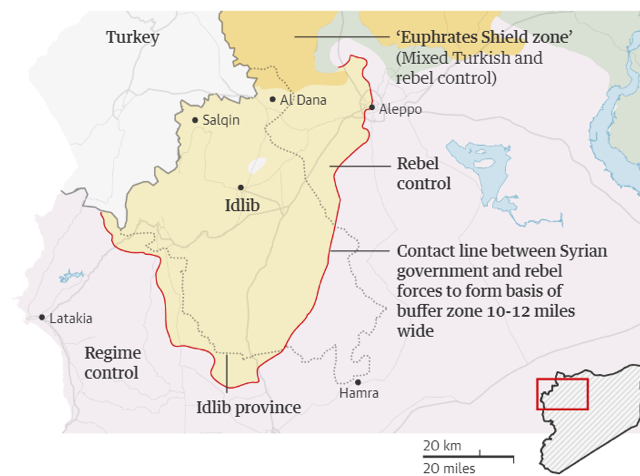
Consequences of the Ongoing Offensive in Idlib
Without the attention it once attracted, the Syrian civil war not only continues, but has even escalated in past weeks due to the ongoing offensive in the last rebel-held province of Idlib. However, what might be perceived as a final push for victory by Bashar Assad’s regime and its allies will most likely bring yet another humanitarian crisis and further destabilize the war-torn country.
In late 2018, Russia and Turkey brokered a deal that was supposed to create a demilitarized buffer zone around the province to mitigate the crisis. Turkey is a key supporter of Syrian rebel groups and thus an important actor in the Idlib region; however, the rebels and Syrian regime continued low-intensity clashes even after the deal was reached. The Syrian Army renewed its offensive with daily airstrikes in December 2019. This offensive is ongoing despite efforts to broker a ceasefire in the beginning of January.

(Source: The Guardian)
Idlib province is home to approximately 3 million civilians and an estimated tens of thousands of fighters, therefore, the potential for an increase in internally displaced persons and a refugee influx to Turkey is significant. For example, at least 350,000 civilians have left the province for Turkey since the renewed offensive. In addition, half a million people fled before the offensive started due to fears of the attacks and sought safety in refugee camps on the Turkish border.
Such a wave of refugees may not only cause problems for Turkey, but for European countries as well. Turkish President Recep Tayyip Erdoğan already threatened the European Union that he would “open the gates” to Europe if Turkey does not receive additional aid to manage the crisis. With more refugees pouring into Turkey as a result of the offensive, Erdoğan might use these developments to put more pressure on the EU.
Moreover, airstrikes have killed dozens of civilians in the past days and weeks. Additionally, the airstrikes left a number of villages in ruins, targeted hospitals and schools. Such actions inflict further damage on the country and its infrastructure resulting in a more expensive, difficult and longer post-war reconstruction in the future.
Besides civilians, the question of rebel fighters present in the province remains. Due to their large estimated numbers, it is improbable that all of them will be killed or captured, therefore, these fighters could pose a security threat in the future. Syria and Iraq have attracted thousands of foreign fighters in the past who could potentially carry out terrorist attacks across the world were they to travel back home or elsewhere. Conversely, they could remain in Syria to continue terrorist activities and make the transition towards peace more difficult.
The Idlib offensive might bring the Syrian civil war closer to an end than ever before, however, the consequences would be severe. Attacks are already taking a toll on civilian lives and exacerbating a relentless humanitarian crisis as hundreds of thousands flee the province. Nevertheless, Assad seems determined to regain control of the entire country. It is a fair assumption that the offensive will mark yet another grim milestone in the 9-year Syrian civil war.
